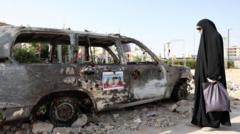As the conflict intensifies, Qatar's diplomatic efforts have been instrumental in brokering peace while maintaining its own security.
**Qatar's Role as Mediator in Israel-Iran Cease-Fire**

**Qatar's Role as Mediator in Israel-Iran Cease-Fire**
Qatar has quietly facilitated negotiations for a truce between Israel and Iran amid escalating tensions.
On June 24, 2025, Qatar stepped into a controversial role as a mediator during the ongoing conflict between Israel and Iran, coinciding with a contentious U.S.-Iran situation. Following a missile strike from Iran that targeted a U.S. military base in Qatar, the nation publicly emphasized its right to self-defense while subtly pushing for an end to hostilities through behind-the-scenes discussions.
During a press briefing shortly after the attack, Majed al-Ansari, the spokesperson for Qatar's foreign ministry, affirmed the country's resolve to engage in resistance if necessary but simultaneously advocated for a cease-fire and de-escalation of Israel-Iran tensions. As tensions escalated, with the U.S. conducting strikes against Iranian nuclear facilities, Iran retaliated by targeting the Al Udeid base in Qatar.
Reportedly, Qatar had prior knowledge of the impending missile assault and effectively intercepted most of the threats aimed at the base, according to Maj. Gen. Shayeq Misfer al-Hajri, the Qatari deputy chief of staff for joint operations.
Experts like Sanam Vakil from Chatham House have acknowledged Qatar's ability to remain pragmatic in the face of conflict, suggesting its unique position allows for constructive engagement. While publicly reinforcing its right to defend itself, Qatar has managed to act as a diplomatic conduit, balancing national security interests with a commitment to regional stability. This dual approach underscores the complexities of Middle Eastern geopolitics as Qatar navigates its relationships with both traditional allies and adversaries.
During a press briefing shortly after the attack, Majed al-Ansari, the spokesperson for Qatar's foreign ministry, affirmed the country's resolve to engage in resistance if necessary but simultaneously advocated for a cease-fire and de-escalation of Israel-Iran tensions. As tensions escalated, with the U.S. conducting strikes against Iranian nuclear facilities, Iran retaliated by targeting the Al Udeid base in Qatar.
Reportedly, Qatar had prior knowledge of the impending missile assault and effectively intercepted most of the threats aimed at the base, according to Maj. Gen. Shayeq Misfer al-Hajri, the Qatari deputy chief of staff for joint operations.
Experts like Sanam Vakil from Chatham House have acknowledged Qatar's ability to remain pragmatic in the face of conflict, suggesting its unique position allows for constructive engagement. While publicly reinforcing its right to defend itself, Qatar has managed to act as a diplomatic conduit, balancing national security interests with a commitment to regional stability. This dual approach underscores the complexities of Middle Eastern geopolitics as Qatar navigates its relationships with both traditional allies and adversaries.























